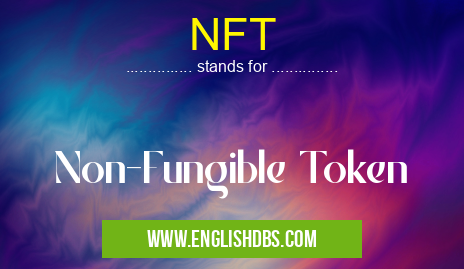What does NFT mean in ART
NFT stands for Non-Fungible Token. It's a unique digital asset that represents ownership of a specific item, such as a piece of art, a collectible, or a virtual item in a game. Unlike traditional fungible tokens like cryptocurrencies, NFTs are not interchangeable and cannot be divided into smaller units.

NFT meaning in Art in Community
NFT mostly used in an acronym Art in Category Community that means Non-Fungible Token
Shorthand: NFT,
Full Form: Non-Fungible Token
For more information of "Non-Fungible Token", see the section below.
Features of NFTs
- Unique: Each NFT has a unique identifier that distinguishes it from all other NFTs.
- Immutable: NFTs are stored on a blockchain, which ensures that they cannot be altered or counterfeited.
- Verifiable: The ownership of NFTs can be easily verified on the blockchain, providing transparency and accountability.
- Tradeable: NFTs can be bought and sold on specialized marketplaces or through peer-to-peer transactions.
Use Cases of NFTs
NFTs have a wide range of use cases, including:
- Digital Art and Collectibles: NFTs can represent ownership of digital artwork, rare collectibles, and unique digital assets.
- Gaming: NFTs can be used to create unique virtual items, characters, and experiences in video games.
- Real Estate: NFTs can be used to represent ownership of real-world assets, such as property and land.
- Supply Chain Management: NFTs can be used to track the provenance and authenticity of physical goods.
Essential Questions and Answers on Non-Fungible Token in "COMMUNITY»ART"
What is an NFT?
A non-fungible token (NFT) is a unique digital asset that represents ownership of a specific item, such as a work of art, a collectible, or a piece of real estate. NFTs are stored on a blockchain, which is a secure, decentralized digital ledger. Each NFT has a unique identification number and metadata that describes the asset it represents.
How are NFTs different from other digital assets?
Unlike traditional digital assets, such as images or videos, which can be easily copied or shared, NFTs are unique and cannot be replicated. This makes them ideal for representing ownership of digital assets that have real-world value, such as collectibles, art, or real estate.
What are the benefits of owning an NFT?
Owning an NFT provides several benefits, including:
- Proof of ownership: NFTs provide verifiable proof of ownership for digital assets.
- Scarcity: NFTs can be limited in quantity, creating scarcity and potential value appreciation.
- Collectibility: NFTs can be collected and traded like physical collectibles, offering potential investment opportunities.
- Investment: NFTs can be bought and sold like other investments, potentially providing financial returns.
How can I buy or sell an NFT?
NFTs can be bought and sold on various online marketplaces, such as OpenSea, Rarible, and SuperRare. To purchase an NFT, you will need a cryptocurrency wallet and the required amount of cryptocurrency to complete the transaction.
What are the potential risks of investing in NFTs?
Like any investment, there are potential risks associated with investing in NFTs, including:
- Volatility: The value of NFTs can fluctuate significantly, leading to potential losses.
- Fraud: There have been cases of fraud and scams in the NFT market, so it is important to research and verify the authenticity of NFTs before investing.
- Lack of regulation: The NFT market is currently unregulated, which can increase the risk of scams and fraudulent activities.
Final Words: NFTs are a revolutionary technology that has the potential to transform various industries and redefine digital ownership. By providing a secure and verifiable way to represent unique assets, NFTs are opening up new possibilities for creators, collectors, and businesses alike. As the NFT market continues to evolve, we can expect to see even more innovative and groundbreaking applications of this technology in the future.
NFT also stands for: |
|
| All stands for NFT |
